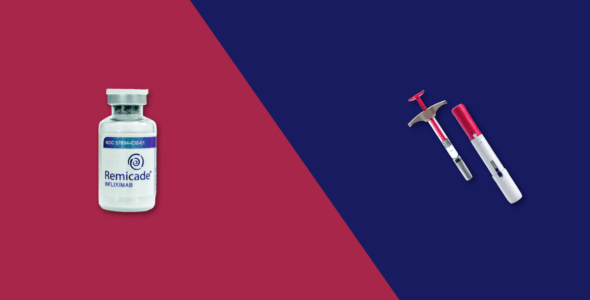Treatment options for ulcerative colitis have expanded quite a bit and now biologic therapies can be used to treat the symptoms of persistent diarrhea, which may contain blood, mucus or pus, stomach aches, and the need to visit the toilet frequently. Ulcerative colitis is a type of inflammatory bowel disease (IBD) that can come and go, making it very unpredictable, and affecting your general health and quality of life. Today we will look at two biologic drugs Entyvio and Humira that are both FDA approved to treat this disease.
What is Entyvio?
Entyvio is a medicine manufactured by Takeda Pharmaceuticals and prescribed to adults to treat moderate to severe ulcerative colitis and Crohn’s disease. It’s usually prescribed when another medicine hasn’t worked well enough or wasn’t well tolerated. There’s no permanent cure for either condition, but they can be managed with medications like Entyvio. It can help reduce the severity of your symptoms and prevent flare-ups.
How does Entyvio work?
The active ingredient in Entyvio is called vedolizumab. It is a type of drug called a monoclonal antibody that reduces inflammation in your gastrointestinal system. When you take Entyvio, vedolizumab is released into your gastrointestinal system. It attaches itself to areas on the surface of your gut cells called integrin receptors.
Usually, when integrin receptors are stimulated by other molecules in your body, they trigger inflammation, but when vedolizumab binds with the integrin receptors it stops other molecules from stimulating them. This reduces how much inflammation occurs in your gastrointestinal system.
How do you take Entyvio?
Entyvio is given to you as a liquid suspension that’s injected into a vein in your arm using an intravenous drip (intravenous infusion). A doctor or nurse usually does this for you. How often you have intravenous infusions will be decided upon by your doctor based on your condition and medical history.
What is Humira?
Humira is an immunosuppressant medication made by Abbvie and is classed as a tumor necrosis factor (TNF) inhibitor. It is prescribed to adults and children to treat inflammatory autoimmune diseases and some other similar inflammatory diseases.
Humira is approved by the FDA to treat the following inflammatory autoimmune diseases:
- Moderate to severe plaque psoriasis in people who are candidates for systemic therapy or phototherapy
- Active psoriatic arthritis in adults
- Rheumatoid arthritis in adults
- Ankylosing spondylitis in adults
- Ulcerative colitis in adults
- Juvenile idiopathic arthritis in children aged 2 years and older
Humira is also approved to treat similar non-autoimmune inflammatory diseases:
- Crohn’s Disease in adults and children aged 6 years and older
- Hidradenitis suppurativa (HS) in adults and children aged 12 years and older
- Uveitis in adults and children aged two years and older
How does it work?
Once Humira is injected into your body, the active ingredient adalimumab helps reduce inflammation. Your immune system releases a protein in your body to trigger inflammation called TNF-alpha (tumor necrosis factor-alpha). Adalimumab attaches to TNF-alpha and stops it from working. This limits the amount of inflammation your immune system can cause.
By reducing inflammation, Humira can provide relief from the symptoms of inflammatory diseases. It can also limit the damage they cause and can stop flare-ups from happening.
How do you take Humira?
Drug administration of Humira is by subcutaneous injection (injecting it under your skin) using either a pre-filled syringe or an injectable pen. It is important to use a new needle each time to prevent the risk of infection. You may have injection site reactions such as redness, bruising, or irritation after administration that will settle down after a few hours. Humira can be given at home through an injection. You will be trained on how to self-administer the injection or it could be done with help from a family member or friend.
Entyvio and Humira side effects
The most common side effects of Entyvio include:
- Headache
- Nausea
- Vomiting
- Joint pain
The most common side effects of Humira include:
- Injection site reactions
- Upper respiratory infections e.g sinus infection
Serious side effects include:
- Suppression of the immune system
- Allergic reactions
- Serious infections
This is not a complete list and medical advice should be taken from your healthcare provider. Always inform your doctor of medicines you use, including over-the-counter drugs, herbal products, and supplements.
What drugs interact with Entyvio and Humira?
Examples of drugs that should not be used with Entyvio and Humira include:
Other medical conditions may affect your treatment with Entyvio or Humira so you should always seek medical advice from the healthcare professional prescribing your drugs. The drug information provided is intended for reference only and should not be used as a substitute for medical advice.
Are there any head-to-head clinical trials comparing Entyvio and Humira?
Yes. The Varsity study is the first study to compare biological agents in (IBD), specifically ulcerative colitis. The results of the trial were published in The New England Journal of Medicine.
Entyvio achieved higher percentages of clinical remission at week 52 compared to Humira in both patients who had never taken an anti-TNF drug (34.2% versus 24.3%, respectively) and patients who had previously taken an anti-TNF drug with ulcerative colitis (20.3% versus 16.0%, respectively).
Also, in the secondary endpoints of the study, treatment with Entyvio was linked with significantly higher percentages of mucosal healing at week 52 compared to patients treated with Humira (39.7% versus. 27.7%).
The Varsity Trial showed the superiority of Entyvio to Humira in achieving clinical remission in patients with active ulcerative colitis.
What is Entyvio’s dosing?
Entyvio is administered by intravenous (IV) infusion. Over half an hour a dose of 300 mg is given and treatment follows this schedule:
- Week 0 (first week) – dose number 1
- Week 1 – no dose
- Week 2 – dose number 2
- Week 6 – dose number 3
After this initial period of six weeks, Entyvio is given every eight weeks, and you are put onto a maintenance dose.
Can Entyvio be used for children?
No. Entyvio is not FDA-approved for use in children. However, there is always the possibility that doctors will use drugs off-license for treating ulcerative colitis in children.







